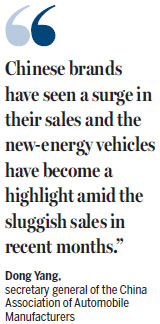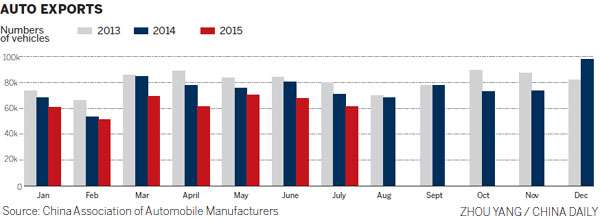Weakened yuan expected to help nation's car exports
After a three-day sharp slide in the renminbi exchange rate against the US dollar, some industrial experts and auto executives are reportedly expecting the lower exchange rate to stimulate more vehicle exports.
However, Dong Yang, secretary general of the China Association of Automobile Manufacturers, said the renminbi exchange rate is still high compared with the Japanese yen and South Korean won.
He said because Chinese carmakers compete with Japanese and South Korean car exporters, new Chinese cars that used to be the same price as many used Japanese or South Korean cars are now similar prices to new Japanese or South Korean cars.
"Despite the fact the renminbi exchange rate against the US dollar dropped, it was still rather high, so the slide of renminbi rate against the US dollar won't work for Chinese carmakers," he added.
Japan and South Korea have applied a series of monetary easing policies to make the Japanese yen and South Korean won low compared with the Chinese renminbi.
Before the significant depreciation of the yen and won, a trader could import a new Chinese car for the same amount of US dollars that could buy a used Japanese or Korean car. Now a new Chinese car has a similar price tag to a new Japanese or Korean car, according to Dong.
A weaker yuan is expected to help made-in-China vehicle exports, which have shrunk in the past two years and were down 14 percent in the first seven months of this year.
Chery, China's biggest vehicle exporter, said the move to devalue the yuan will help its sales overseas and shipments will rise by 20 percent this year, Yin Tongyue, chairman of Chery, told Bloomberg.

In terms of Chinese carmakers going overseas, Dong said it takes at least two to three years to fully set up a plant abroad.
"Only until the products and technologies hit standards, a reasonable currency level, mature policies as well as sufficient production capacity are ready, they can achieve their targets to make their footholds," he said.
Domestic surge
July saw Chinese consumers buy the fewest passenger vehicles for 17 months, extending a slump in the world's largest auto market as deeper discounts failed to revive demand.
Figures from the China Association of Automobile Manufacturers showed passenger vehicle sales declined 6.6 percent, also to a 17-month low.
Dong said, "Chinese brands have seen a surge in their sales and the new-energy vehicles have become a highlight amid the sluggish sales in recent months."
During the first seven months of this year, 4.67 million Chinese branded passenger vehicles were sold, a rise of 13.58 percent year-on-year.
These sales accounted for 41.17 percent of the total passenger vehicles sold during the period, up 3.69 percentage points.
German, Japanese, South Korean and French brands accounted for 19.65 percent, 15.53 percent, 12 percent and 7.9 percent respectively.
Yin said that Chery's portfolio will be powered by some of its leading models, including Cowin and Kerry, of which the company expects combined sales to hit 100,000 units by the end of this year.
In the new-energy vehicle sector, China produced 95,530 units and sold 89,549 units during the first seven months, a jump of 2.5 and 2.6 times compared with last year.
The number of pure electric vehicles produced and sold stood at 60,294 and 55,180 respectively during the same period, with growth of 2.7 and 3 times compared with last year.
The number of plug-in hybrids produced and sold between January and July stood at 60,294 and 34,369, increasing by 2.2 and 2.1 times.
"The momentum will be on a upward swing in the following months," Dong said. Yin is upbeat in regards to Chery's NEV models, which he expects the company to sell 10,000 of during 2015.
Policy-driven NEV sector
Zhao Xinzhi, director of Nielsen China Auto Vertical, which jointly published a white paper with the China Association of Automobile Manufacturers last week, said Chinese consumers have been long awaiting more incentives in the sector in addition to the 10 issued during the first half of this year.
Zhao said that 53.9 percent of local citizens surveyed for the white paper book were aware of the government subsidies offered for NEV buyers.
He said the sector's growth should be transformed from policy-driven into consumer interest-driven in China.
Contact the writers at yangcheng@chinadaily.com.cn

(China Daily 08/17/2015 page19)














